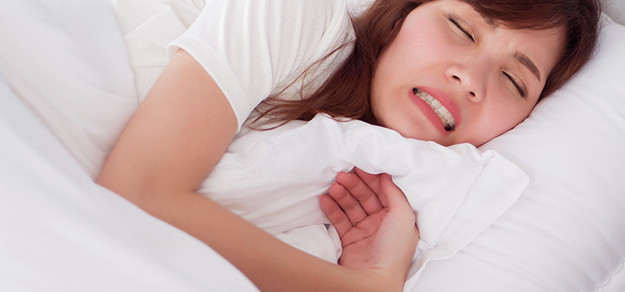Is Teeth Grinding (Bruxism) Hereditary?
13th Feb 2020

One of the first things I wondered when I was diagnosed with bruxism was: is bruxism hereditary? My dad also wears a night guard--does this condition have anything to do with genetics? Of course, it’s not the worst condition I could pass down to my kids, but I care about oral health, and I did start wondering about the possibility.

Is teeth grinding (bruxism) genetic?
From Cystic Fibrosis to Alzheimer’s Disease, many of the medical conditions out there have a genetic link, and there does appear to be a link with bruxism as well. That being said, having a parent with bruxism isn’t a guarantee that you’ll grind your teeth, too. Many other factors come into play and as with most things in life, the answer to this question isn’t black and white. Continue reading to learn more about what causes teeth grinding and clenching and just how much your genetics might play a role.
What is bruxism?
Bruxism is the name for teeth grinding and clenching, and it typically affects sufferers at night. You might first hear about bruxism when your dentist mentions he or she thinks you might have the condition. Your dentist might notice unnatural tooth wear, worn enamel, or bony growths known as tori mandibularis. Those bony growths near my lower teeth were actually one of the symptoms that alerted my dentist to my nighttime upper and lower jaw clenching.
On the other hand, you might be suffering from some of the symptoms of bruxism, which leads you to investigate on your own. You should never self-diagnose, but if you’re having some of the following symptoms and you haven’t yet had a conversation with your dentist about sleep bruxism, it might be time to make an appointment to get some medical advice.
Related Articles:
- Why Do My Teeth Hurt When I Wake Up?
- Do I Really Need a Night Guard?
- Weighted Blanket For Teeth Grinding
Common symptoms of bruxism:
Toothache
Unpleasant Symptoms Upon Waking:
Including: headache, jaw pain, face pain, sore jaw, earache, jaw joint pain or soreness
Tooth Damage:
Including cracked, chipped, or worn teeth
Disrupted Sleep:
Your partner might even be the one to notice you grind your teeth if the sound wakes him or her up
Pain or soreness in your jaw muscles doesn’t always point to tooth grinding; for example, it could be a sign of TMJ (temporomandibular joint disorders), an abscessed tooth, or even more serious problems. On the other hand, it may be very easy for you to tell if you have bruxism if you have awake bruxism. As the name implies, people with awake bruxism grind or clench their teeth during the day. Talk to your dentist about your symptoms or seek immediate medical help if your jaw pain is acute or you think it’s a sign of something more serious.
Back to bruxism: what causes this disorder that affects an estimated 8-16% of the population? The jury is still out on that one, but there are quite a few theories. Based on your symptoms and the severity of your bruxism, your dentist may have some insight into what is causing bruxism in your case.

Common suspected causes of bruxism:
Stress and Anxiety:
Stress and anxiety, whether conscious or not, can cause you to clench and grind your teeth.
Medication and Drugs:
Some medications are suspected to cause bruxism, such as antidepressants. Bruxism has also been linked to consuming or using alcohol, tobacco, and recreational drugs.
Sleep Apnea:
It is thought that one in four people with this sleep disorder also grind their teeth due to the automatic stress response in their body when they are jolted awake after a lapse in breathing.
Jaw Misalignment:
Also called malocclusion, this might cause you to grind your teeth at night as your teeth don’t naturally rest where they should.
What about genetics?
Multiple studies have concluded that teeth grinding does, in fact, run in families. 21-50% of people who have bruxism have an immediate family member who also has the condition. While there is a connection, no studies have found an absolute genetic link, so there is no proof that your mom passed her bruxism to you or that you passed yours to your children. It could be, for example, that you and your mother both have high stress levels and that your stress causes you both to grind your teeth at night.
Because bruxism runs in families, it might be possible that those with a family history of bruxism are more likely to develop the condition when faced with one or more of the suspected causes. For example, if your dad has bruxism, you might be more likely to develop bruxism as a side effect of taking an antidepressant than someone without bruxism among their family members.
Dr. Dana Walters, DDS has also noticed the family connection with teeth grinding. She notes that family members who have teeth grinding in common also tend to have other things in common, including increased hormone levels, variations in certain genes, and neurotransmitter morphisms.
Some other risk factors affect your chance of developing bruxism, including your age and your lifestyle. Many people are surprised to find that children tend to suffer from bruxism more than adults. Lifestyle decisions, such as drug use or anxiety management may play a role in your chances of developing bruxism as well. The prevalence among men and women is very similar.
Is there a clear cut answer on whether bruxism is caused by genetics? No. Can a family history of bruxism predispose you to bruxing as well? As it appears, yes. If you have at least one of the suspected causes of bruxism and one of your close family members has bruxism, you may find yourself bruxing in the future, if you’re not already.
Related Articles:
What can my family members and I do about bruxism?
A very common technique to manage bruxism is the use of mouthguards, in fact if you have a family member who is prone to teeth grinding and clenching, you might have noticed that he or she already uses a night guard. A night guard, also known as an occlusal splint, will help relieve the symptoms and protect your teeth, but it’s not going to stop you from the act of tooth grinding or clenching.
There are alternative approaches to treat and even eliminate bruxism, and many of these involve removing the suspected cause. For example, if you find out that you have sleep apnea, a CPAP machine used to treat sleep apnea might also stop your grinding. Similarly, if you or your dentist suspect your bruxism is caused by a medication, finding a suitable alternative medication might do the trick. Never stop taking medication without the supervision of your doctor.
When bruxism is due to stress, anxiety, or other psychological factors, some people have found relief by working on reducing and managing their stress and anxiety. Some popular methods include exercise, meditation, and cognitive behavioral therapy.
Mild cases of bruxism are annoying and severe cases are damaging, but thankfully no cases of bruxism are life threatening. The anecdotal genetic link is definitely there for bruxism, but the jury is still out on the definitive cause.
Sources:

- Most Popular
- Hard Outside, Soft Inside
- 2MM Thick
- Moderate / Heavy

- Most Durable
- Hard Materials
- 1.5MM Thick
- Heavy / Severe

- For Day Time Use
- Thin, Barely Visible
- 1MM Thick
- Light / Moderate

- For Clenching
- Flexible & Soft
- 1.5MM Thick
- Light / Moderate

